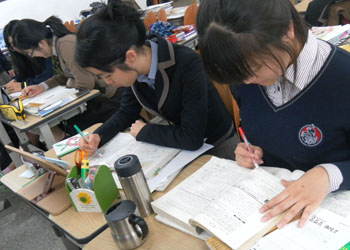 By Jane Lee
By Jane Lee
Gyeonggi Academy of Foreign Languages, Grade 11
South Korea___11/15/10 – It is almost time for this year’s high school seniors to face one of the most important moments of a Korean student’s academic life.
“There’re only a few days left until the big test, and I’m trying to stay calm. I was really nervous before, but now I’m a lot better. More than anything I just hope I can take the test with all the ability I have,” Shim Chan, a GAFL senior at Gyeonggi Academy of Foreign Languages (GAFL), said.
This year’s Korean National Scholastic Achievement Examination for College Entrance(수능) will be held on November 18. While last year’s test was held on November 11, this year’s test was postponed one week due to the 2010 Seoul G-20 summit being held from November 11 to 12. In the United States, high school students are given the chance to take the SAT or ACT several times a year, but in Korea, high school seniors have only once chance to show universities all the knowledge that they had learned during their high school years.
“Of all the tests I’ve taken, I really hope that this one will yield the best results,” GAFL senior, Hee-Won Shin, said.
The national exam consists of five periods for different subjects – Korean language, math, English, science or social studies, and another foreign language such as Japanese, Chinese, French, Spanish, etc. – and the tests vary in time. The entire exam takes about seven hours (counting only the examination time alone).
Many posters and banners can be seen around GAFL’s campus wishing seniors good luck. A clock placed right in front of the dormitories where all the seniors live counts down the remaining days left until exam day. The school cafeteria and the student council prepared two separate events for the seniors, the latter including a gift to the seniors that contained letters to every senior from juniors.
“Since they studied hard for three years, I’m sure that their effort will not be in vain and that such studying will produce great results on the day of the test,” Ah Young Song, a junior, said. “I really hope that they will not make mistakes and will not be too nervous.”
Because of the serious nature of the exam as an annual event, it is a very sensitive topic in Korea, especially to seniors. Fellow students and teachers are careful not to say words such as “drop” or “fall” near seniors for fear that such words may bring bad luck. Many underclassmen give letters of encouragement and presents to seniors, like chapsal dduk (a kind of Korean traditional sticky rice cake) or yeot (a Korean taffy) to help seniors “stick” to the universities that they desire to attend. Also during this time of the year, it is not uncommon to see various religious sites, such as Buddhist temples or churches, overflowing with family members praying for a senior’s good test score.
Increasingly, as many educators, students, and parents voice their concern and opposition to the system of judging students through only a single test score, the college admission trend these days is leaning more towards a system like the United States’ where a student’s college application includes other indicators of the student’s potential to succeed such as extra-curricular activities and leadership.
“Many students and parents seem too obsessed with the results of the test. That kind of social atmosphere is a problem, so I think there should be ways in which students can be evaluated on their scholarly achievements and at the same time do various activities during their high school years,” Young Ok Baek, a Korean language teacher at GAFL, said.

